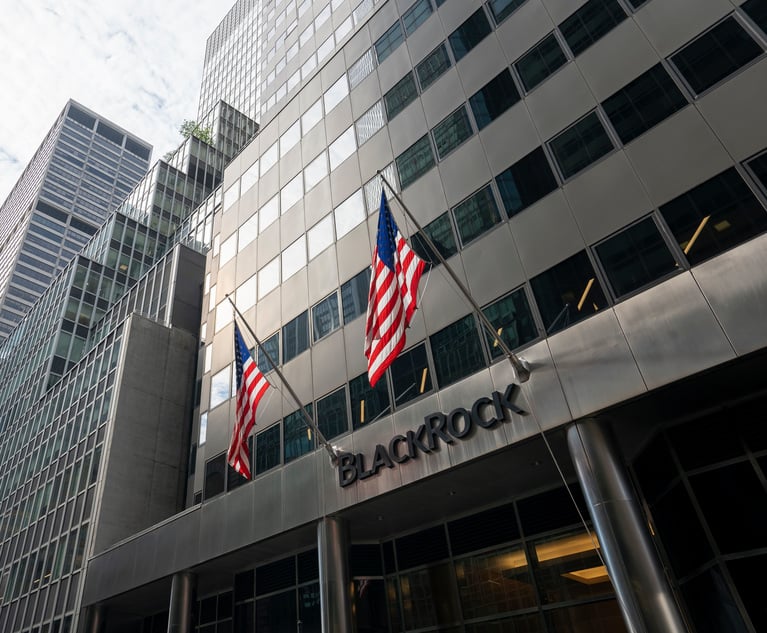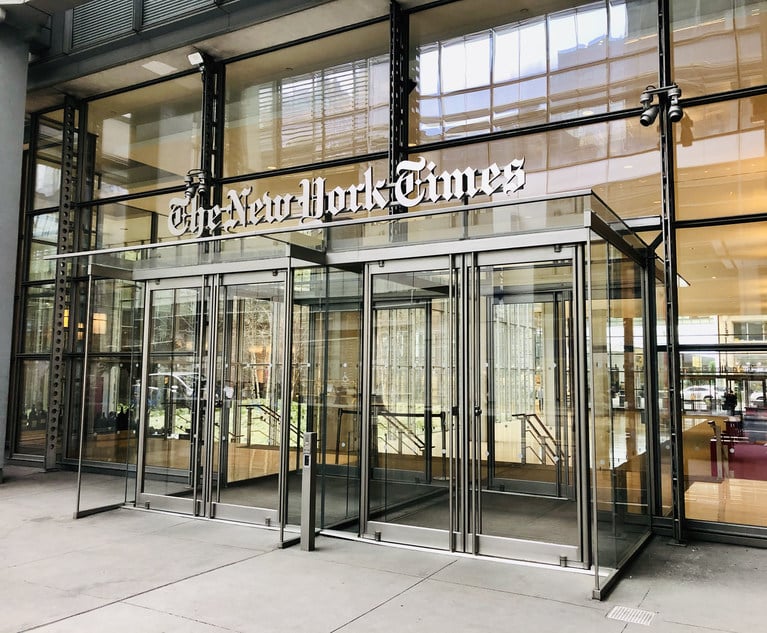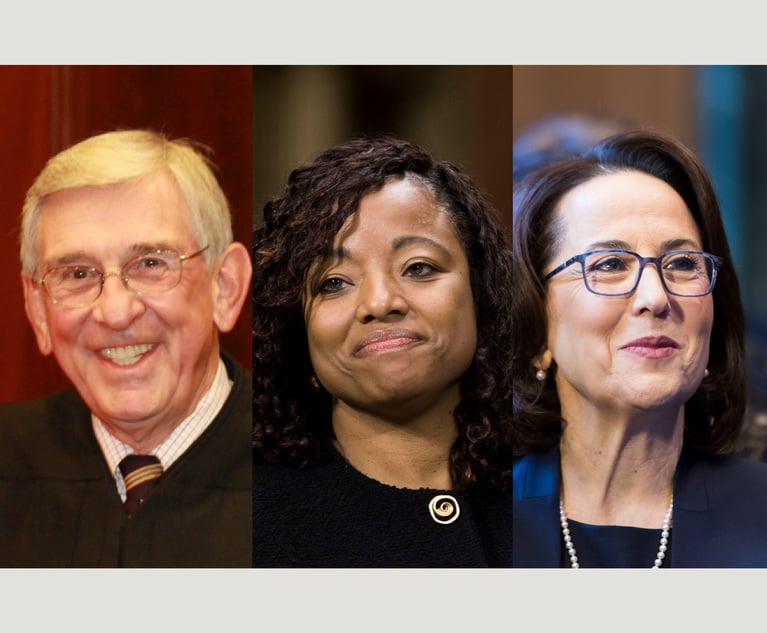Key Justices Frown on California Abortion Speech Law
California's law that requires "pro-life" pregnancy centers to inform clients about abortion appeared to be in jeopardy Tuesday after arguments before the U.S. Supreme Court.
March 20, 2018 at 03:31 PM
3 minute read
 Anti-abortion supporters outside the U.S. Supreme Court in Washington onTuesday, March 20, 2018. (AP Photo/Andrew Harnik)
Anti-abortion supporters outside the U.S. Supreme Court in Washington onTuesday, March 20, 2018. (AP Photo/Andrew Harnik)
California's law that requires “pro-life” pregnancy centers to inform clients about abortion appeared to be in jeopardy Tuesday after arguments before the U.S. Supreme Court.
The case of National Institute of Family and Life Advocates v. Becerra drew more than 100 demonstrators on both sides of the abortion debate in front of the court. Dozens of people camped out starting Monday to secure a seat for the hourlong argument.
The pregnancy centers, backed by Alliance Defending Freedom, claim that the law amounts to compelled speech, in violation of the First Amendment's free speech clause. The same conservative group is also backing a similar First Amendment challenge in the pending case of Masterpiece Cakeshop v. Colorado Civil Rights Commission.
Here are three highlights from the argument:
➤ Kennedy Is Key: If, as usual, Justice Anthony Kennedy casts the deciding vote, it looks like he would strike down the California law. He offered a hypothetical: “What would happen if an unlicensed entity, unlicensed center, just had a billboard that said 'Choose Life.' Would they have to make the disclosure?” ADF president Michael Farris responded yes, adding that the disclosure about abortion options would also have to be the same size and in multiple languages. Using a phrase often associated with striking down abortion restrictions, Kennedy responded, “It seems to me that that means that this is an undue burden … that should suffice to invalidate the statute.” Justice Samuel Alito Jr. also seemed hostile toward the law, while others in the conservative majority did not tip their hand.
➤ Goose v. Gander: Several liberal justices—but not enough for a majority—suggested that if the California law is unconstitutional, so too should be the laws in other states that require abortion providers to inform patients about adoption and other alternatives to abortion. “In the law, as you well know, what is sauce for the goose is sauce for the gander,” said Justice Stephen Breyer. Justice Elena Kagan said the California law is the “exact flip side” of such “informed consent” laws, which were upheld in the 1992 case Planned Parenthood of Southeastern Pennsylvania v. Casey. Farris said those laws were different from California's because they involved medical intervention rather than counseling.
➤ Gerrymandered Statute: Farris repeatedly said that the California law was “gerrymandered” to single out certain individuals and facilities who had to make the required notifications, while others did not. Kagan picked up on the unusual reference, stating that “if the [statute] is gerrymandered, that's a serious issue—in other words, if we have these general disclosure requirements, but we don't really want to apply them in general, we just want to apply them to some speakers whose speech we don't much like.” Deputy California Solicitor General Joshua Klein insisted that the law was not targeted toward “any particular viewpoint. But the fact that Kagan raised the question suggested that her vote might be in play.
This content has been archived. It is available through our partners, LexisNexis® and Bloomberg Law.
To view this content, please continue to their sites.
Not a Lexis Subscriber?
Subscribe Now
Not a Bloomberg Law Subscriber?
Subscribe Now
NOT FOR REPRINT
© 2025 ALM Global, LLC, All Rights Reserved. Request academic re-use from www.copyright.com. All other uses, submit a request to [email protected]. For more information visit Asset & Logo Licensing.
You Might Like
View All
US Courts Announce Closures in Observance of Jimmy Carter National Mourning Day
2 minute read
Who Got the Work: Gibson Dunn and Wilmer to Defend BlackRock in ESG Antitrust Lawsuit
2 minute read
New York Times Moves for $100K in Attorney Fees Against Dfinity Foundation
3 minute read
Split 4th Circuit Revives Constitutional Challenge to Child Vaccine Mandate
Trending Stories
- 1Restoring Trust in the Courts Starts in New York
- 2'Pull Back the Curtain': Ex-NFL Players Seek Discovery in Lawsuit Over League's Disability Plan
- 3Tensions Run High at Final Hearing Before Manhattan Congestion Pricing Takes Effect
- 4Improper Removal to Fed. Court Leads to $100K Bill for Blue Cross Blue Shield
- 5Michael Halpern, Beloved Key West Attorney, Dies at 72
Who Got The Work
Michael G. Bongiorno, Andrew Scott Dulberg and Elizabeth E. Driscoll from Wilmer Cutler Pickering Hale and Dorr have stepped in to represent Symbotic Inc., an A.I.-enabled technology platform that focuses on increasing supply chain efficiency, and other defendants in a pending shareholder derivative lawsuit. The case, filed Oct. 2 in Massachusetts District Court by the Brown Law Firm on behalf of Stephen Austen, accuses certain officers and directors of misleading investors in regard to Symbotic's potential for margin growth by failing to disclose that the company was not equipped to timely deploy its systems or manage expenses through project delays. The case, assigned to U.S. District Judge Nathaniel M. Gorton, is 1:24-cv-12522, Austen v. Cohen et al.
Who Got The Work
Edmund Polubinski and Marie Killmond of Davis Polk & Wardwell have entered appearances for data platform software development company MongoDB and other defendants in a pending shareholder derivative lawsuit. The action, filed Oct. 7 in New York Southern District Court by the Brown Law Firm, accuses the company's directors and/or officers of falsely expressing confidence in the company’s restructuring of its sales incentive plan and downplaying the severity of decreases in its upfront commitments. The case is 1:24-cv-07594, Roy v. Ittycheria et al.
Who Got The Work
Amy O. Bruchs and Kurt F. Ellison of Michael Best & Friedrich have entered appearances for Epic Systems Corp. in a pending employment discrimination lawsuit. The suit was filed Sept. 7 in Wisconsin Western District Court by Levine Eisberner LLC and Siri & Glimstad on behalf of a project manager who claims that he was wrongfully terminated after applying for a religious exemption to the defendant's COVID-19 vaccine mandate. The case, assigned to U.S. Magistrate Judge Anita Marie Boor, is 3:24-cv-00630, Secker, Nathan v. Epic Systems Corporation.
Who Got The Work
David X. Sullivan, Thomas J. Finn and Gregory A. Hall from McCarter & English have entered appearances for Sunrun Installation Services in a pending civil rights lawsuit. The complaint was filed Sept. 4 in Connecticut District Court by attorney Robert M. Berke on behalf of former employee George Edward Steins, who was arrested and charged with employing an unregistered home improvement salesperson. The complaint alleges that had Sunrun informed the Connecticut Department of Consumer Protection that the plaintiff's employment had ended in 2017 and that he no longer held Sunrun's home improvement contractor license, he would not have been hit with charges, which were dismissed in May 2024. The case, assigned to U.S. District Judge Jeffrey A. Meyer, is 3:24-cv-01423, Steins v. Sunrun, Inc. et al.
Who Got The Work
Greenberg Traurig shareholder Joshua L. Raskin has entered an appearance for boohoo.com UK Ltd. in a pending patent infringement lawsuit. The suit, filed Sept. 3 in Texas Eastern District Court by Rozier Hardt McDonough on behalf of Alto Dynamics, asserts five patents related to an online shopping platform. The case, assigned to U.S. District Judge Rodney Gilstrap, is 2:24-cv-00719, Alto Dynamics, LLC v. boohoo.com UK Limited.
Featured Firms
Law Offices of Gary Martin Hays & Associates, P.C.
(470) 294-1674
Law Offices of Mark E. Salomone
(857) 444-6468
Smith & Hassler
(713) 739-1250










